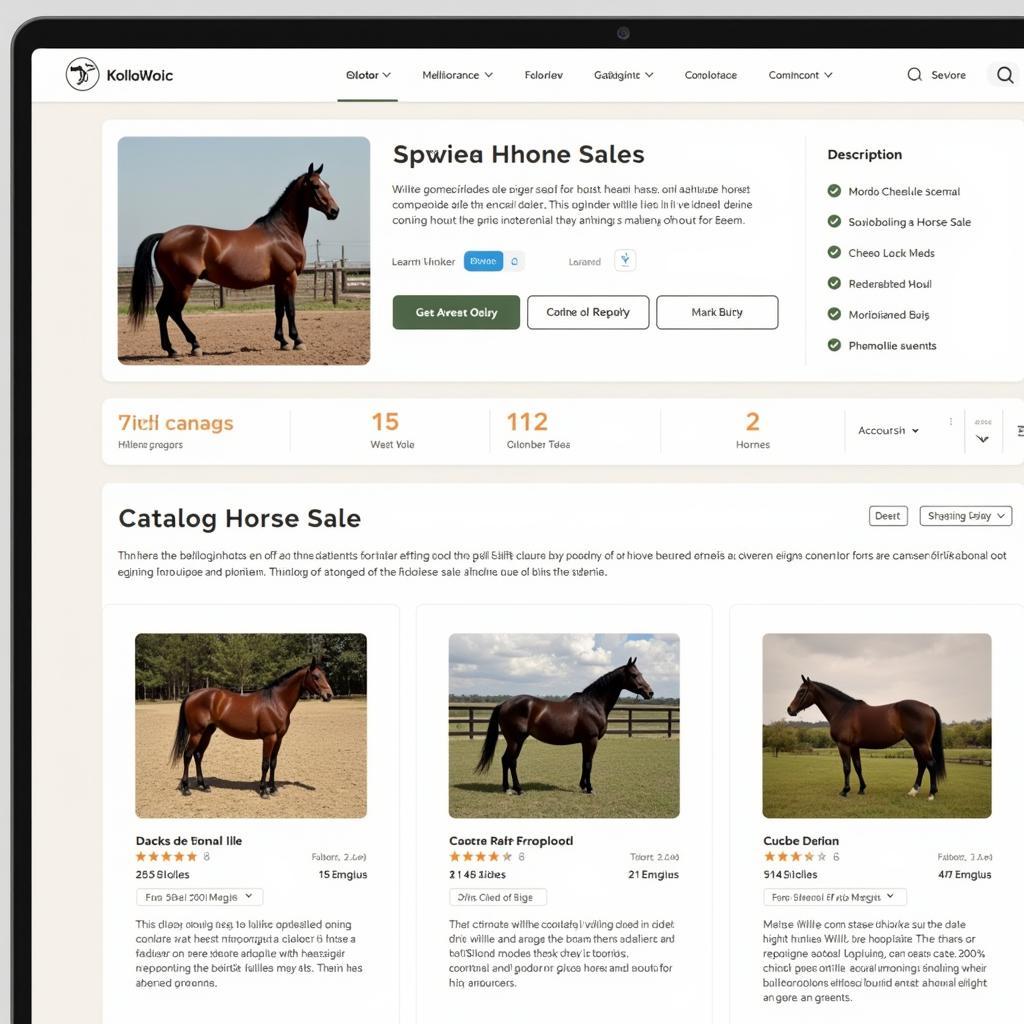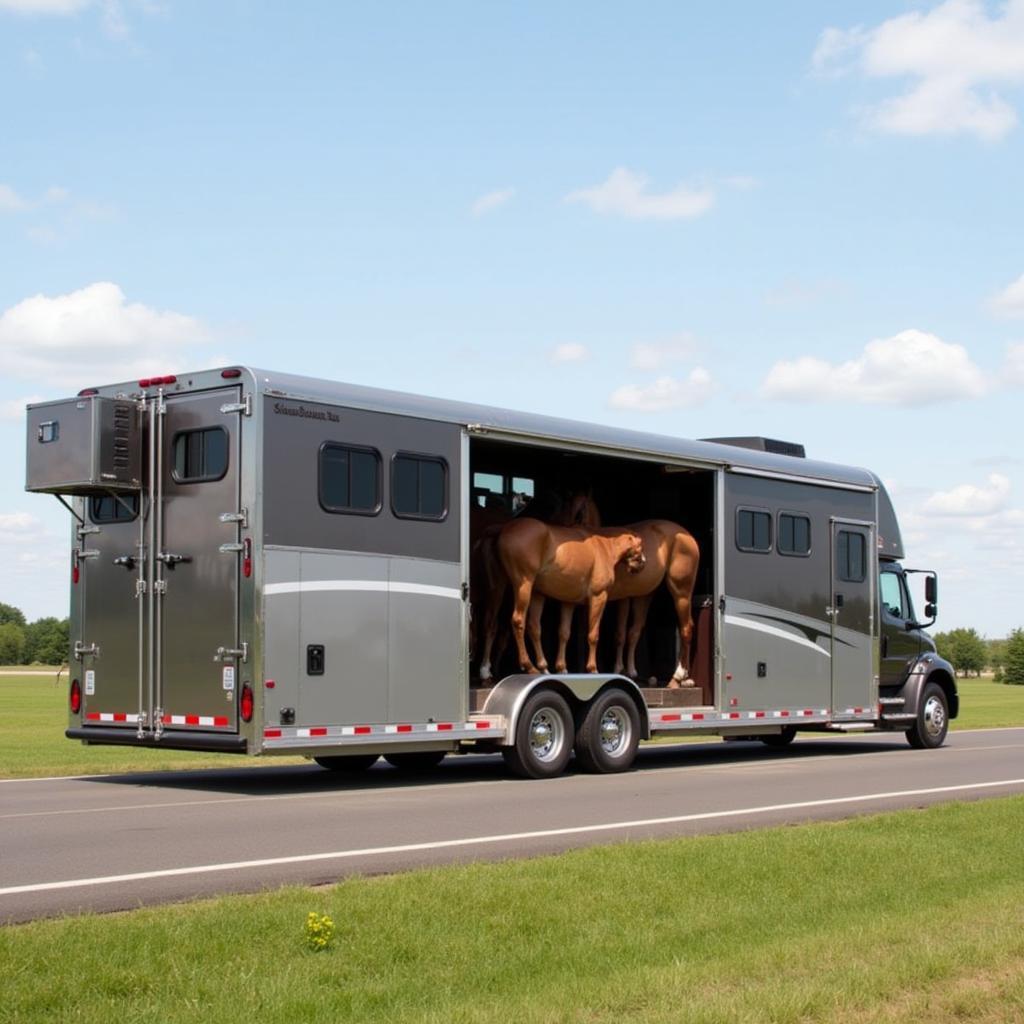Catalog Horse Sales have become an increasingly popular way to buy and sell horses, offering a convenient platform for both sellers and potential buyers. But navigating the world of catalog horse sales can feel like uncharted territory for newcomers. What should you look for in a catalog? How do you assess a horse remotely? This guide is designed to demystify the process, providing you with the knowledge and confidence to make informed decisions in the exciting realm of catalog horse sales.
What are Catalog Horse Sales?
Catalog horse sales are auctions or private treaty sales where horses are listed in a printed or online catalog. These catalogs typically include detailed information about each horse, including their pedigree, performance history, health records, and often, photos and videos.
Advantages of Buying at a Catalog Horse Sale
There are several benefits to exploring catalog horse sales:
- Wide Selection: Catalog horse sales offer a vast selection of horses from different breeds, disciplines, and locations, allowing you to browse a diverse pool of potential partners.
- Convenience: You can peruse the offerings from the comfort of your own home, taking your time to research and compare horses without the pressure of an in-person auction environment.
- Transparency: Reputable catalog horse sales provide comprehensive information about each horse, including their history, health, and any potential issues, fostering informed decision-making.
 Online Catalog Horse Sales Platform
Online Catalog Horse Sales Platform
Navigating the Catalog: Key Information to Look For
When evaluating horses in a catalog, pay close attention to the following details:
- Pedigree and Bloodlines: The horse’s ancestry can offer insights into potential temperament, athleticism, and suitability for specific disciplines.
- Performance History: Look for information on the horse’s show record, competition experience, and any notable achievements.
- Conformation and Soundness: Photos and videos, while helpful, shouldn’t be the sole basis for your assessment. Request additional images or videos from various angles if necessary.
- Health Records: Reputable catalogs will provide detailed health information, including vaccination records, Coggins test results, and any previous injuries or illnesses.
Due Diligence: Steps to Take Before You Bid
- Contact the Seller: Don’t hesitate to reach out to the seller directly to ask specific questions and gain further insights into the horse’s personality, training, and suitability.
- Independent Veterinary Examination: Always insist on a pre-purchase exam conducted by a veterinarian of your choosing. This comprehensive assessment will provide an objective evaluation of the horse’s health and soundness.
- Trial Period: If possible, negotiate a trial period to ride and interact with the horse in person before finalizing the purchase.
Making an Informed Decision:
- Set a Budget: Determine your budget upfront, considering the purchase price, transportation costs, and ongoing expenses associated with horse ownership.
- Trust Your Instincts: If something doesn’t feel right or you have any doubts, trust your gut and move on to other options.
Conclusion
Catalog horse sales provide a unique avenue for connecting with your equine partner. By approaching the process with knowledge, preparation, and a discerning eye, you can navigate the world of catalog horse sales successfully. Remember, patience, research, and careful consideration are your allies in finding the perfect horse to welcome into your life.
FAQ
What are the risks of buying a horse from a catalog?
While catalog horse sales offer convenience and a wide selection, they also come with inherent risks. It’s crucial to conduct thorough research, communicate openly with sellers, and prioritize a pre-purchase exam to mitigate potential issues.
How can I ensure the information in a horse catalog is accurate?
Choose reputable catalog horse sales with a proven track record. Look for detailed descriptions, clear photographs, and transparency regarding the horse’s history and health. Don’t hesitate to request additional information or references from previous buyers.
Can I return a horse purchased through a catalog sale?
Return policies vary widely between different catalog horse sales. It’s essential to carefully review the terms and conditions outlined by the specific sale organizer before making a purchase.
billings-livestock-horse-sale-catalog provides comprehensive information on the horses, making it a valuable resource.
How do I arrange transportation for a horse purchased through a catalog?
Most catalog horse sales have established relationships with reputable equine transportation companies. They can often provide quotes and assist in coordinating the safe and timely delivery of your new equine partner.
What if I have a problem with a horse purchased through a catalog sale after the sale is complete?
It’s crucial to address any concerns with the seller as soon as possible. Document all communication and any agreements made. Consider seeking legal advice if you encounter unresolved issues.
 Equine Transportation for Long Distances
Equine Transportation for Long Distances
For those looking for horse sales in specific locations, you can check horse sale springfield mo or explore upcoming auctions with the new holland horse auction schedule 2023.
If you’re interested in draft horses, the boone county draft horse sale could be a good option. To see the outcomes of past sales, check out the billings livestock horse sale results.
For any assistance regarding horse sales, please contact us at Phone Number: 0772127271, Email: [email protected] or visit us at Address: QGM2+WX2, Vị Trung, Vị Thuỷ, Hậu Giang, Việt Nam. Our dedicated customer support team is available 24/7 to answer your queries and provide comprehensive assistance.